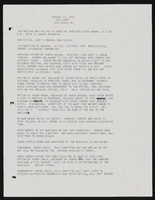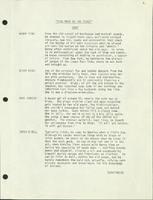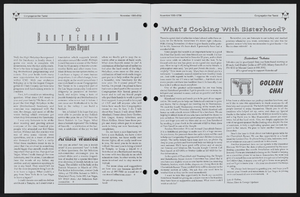Search the Special Collections and Archives Portal
Search Results

Transcript of interview with Billy Paul Smith by Claytee White, October 3, 2013
Date
Archival Collection
Description
Chemist, mathematician, and health physicist Billy Paul Smith donates time to tutor young people in hopes of attracting more youth into the fields of math and science. Born in 1942 and schooled in segregated black schools in Shreveport, Louisiana, and Texarkana, Texas, he graduated from high school at age fifteen and enrolled at Prairie View A&M University, where he trained with the Reserve Officer Training Corps (ROTC) and earned his Bachelor’s degree in chemistry and in 1964 his Master’s degrees in chemistry and math. Most young U.S. Army officers in 1964 went to Vietnam, but Billy’s math and science background steered him to the Army Chemical Corps, where he was quickly selected to join a new team. The team was to develop responses to nuclear weapon accidents and worked under the Defense Atomic Support Agency (DASA) in Albuquerque, New Mexico. At the same time, Billy completed the Weapons Ordinance Army course on classified information relating to the U.S. nuclear weapons arsenal. In this interview, Billy talks about his service with DASA and his subsequent twenty-seven years working at the Nevada Test Site in a variety of positions with Reynolds Electrical and Engineering Company, Inc. (REECo), a company that had “percentagewise more blacks in management positions than any other [Las Vegas] company.” He experienced the quiet racism of Las Vegas residential segregation when he tried to purchase a house in a neighborhood he liked and the unexpected kindness of the REECo general manager, Ron Keen, who made sure the Smith family could live where they wanted to live. He talks about Area 51 and explains underground testing activity and offers the scientific and ecological reasons why scientists deemed Yucca Mountain safe to store nuclear waste. After retiring at fifty-two, Billy and a colleague formed an independent instrumentation company, which, from 1995–2005 provided and calibrated radiological measurement and detection instruments for the decommissioning and closure of the Rocky Flats nuclear plant in Golden, Colorado. During that time, Billy rented an apartment in Boulder, but he and Jackie maintained their Las Vegas home, where they still reside. Billy shares memories of places he and his wife used to enjoy on the Westside and tells of their longtime friends in the black community. He also talks about developing his philosophy of philanthropy through Alpha Phi Alpha Fraternity and discusses becoming a member of the Knowledge Fund Advisory Council for the Governor’s Office of Economic Development (GOED) and the advisory council for the Nevada System of Higher Education.
Text

Alpha Kappa Alpha Sorority, Theta Theta Omega Chapter meeting minutes (redacted)
Date
Archival Collection
Description
From the Alpha Kappa Alpha Sorority, Incorporated, Theta Theta Omega Chapter Records (MS-01014) -- Chapter records file.
Text

Emmanuel Ortega oral history interview: transcript
Date
Archival Collection
Description
Oral history interview with Emmanuel Ortega conducted by Monserrath Hernandez, Maribel Estrada Calderon, Elsa Lopez, Barbara Tabach, and Laurents Bañuelos Benitez on 2019 for the Latinx Voices of Southern Nevada Oral History Project. Emmanuel Ortega was born in Artesia, California and was raised in Ciudad Juárez, Mexico before moving to El Paso, Texas with his family at the age of thirteen. In 1998 his family relocated once again from El Paso to Las Vegas, Nevada where his father joined the Carpenters Union. They settled in Green Valley and he began attending a hybrid community college and high school program allowing him to obtain college credits. He continued at the College of Southern Nevada for two more years where he was a photography major and later transferred to the University of Nevada, Las Vegas (UNLV) where he studied art history. He moved back to Las Vegas in 2011 where he began teaching at UNLV and received a PhD in Ibero-American colonial art history from the University of New Mexico in 2017. He is the co-host of the podcast "Latinos Who Lunch" where hosts discuss pop culture, art, and issues of race, sex, and gender in the Latinx community.
Text

Gregory Koehler oral history interview: transcript
Date
Archival Collection
Description
Oral history interview with Gregory Koehler conducted by Claytee D. White on May 15, 2019 for the Remembering 1 October Oral History Project. Koehler begins talking about his family, early life, and occupation. He explains the line of jobs he has had, his history with firefighting, and how he moved to Las Vegas, Nevada in 2003. Koehler then recalls how he had attended the Route 91 Festival concert and the events that unfolded during the shooting. He describes what he saw, felt, and how he tried to help the people who were shot. Lastly, he talks about the aftermath of the event and the struggles he had gone through.
Text

Anita Tijerina Revilla oral history interview: transcript
Date
Archival Collection
Description
Oral history interview with Anita Tijerina Revilla conducted by Marcela Rodriguez-Campo on October 09, 2018 for the Latinx Voices of Southern Nevada Oral History Project. In this interview, Revilla discusses her early life in San Antonio, Texas. She talks about her decision to make education a priority, figuring out the college application process on her own, and her initial interest in social justice. Revilla talks about how her critical consciousness was developed, and her pedagogical approach to teaching. Revilla describes her role in the 2006 May Day march, advocating advocating for the queer community, and disrupting oppressive systems to increase educational access for students. Lastly, Revilla discusses ethnic studies and the history of inequality in the United States.
Text

Brian Shepherd oral history interview: transcript
Date
Archival Collection
Description
Oral history interview of Brian Shepherd conducted by Claytee D. White on July 13, 2020 for the Boyer Early Las Vegas Oral History Project. Brian Shepherd, Chief of Staff of Service Employees International Union (SEIU) Local 1107, represents health care and public sector employees across the state of Nevada. SEIU advocates for fair wages, quality health care, and the "secret ballot" for all union employees. Shepherd discusses his work with the union, racism, discrimination, inequality, organizing protests, the Black Lives Matter movement, and social justice.
Text

Charles Lee Hank III oral history interview: transcript
Date
Archival Collection
Description
Oral history interview with Charles Lee Hank III conducted by Claytee D. White and Barbara Tabach on April 10, 2019 for the Remembering 1 October Oral History Project.
Charles Lee Hank III describes his experience with police growing up in Chicago and the dichotomy he feels now as a police officer for the Las Vegas Metropolitan Police Department (LV Metro). Hank discusses the events of the October 1 shooting at the Route 91 Festival, the chaotic experience he and other officers experienced as they looked for the shooter in the Mandalay Bay, and the aftermath as a member of the Las Vegas community and as an officer of LV Metro.
Subjects discussed include: Las Vegas Strip Area Command.
Text

Script for television pilot, This Must Be the Place by Hank Henry and Bill Willard, 1950s
Date
Archival Collection
Description
The preface and script for a sitcom television show conceived of by Hank Henry and Bill Willard "to evoke the spirit of fun and laughs springing out of conflict and understanding between the old comedy school and the new school."
Text


